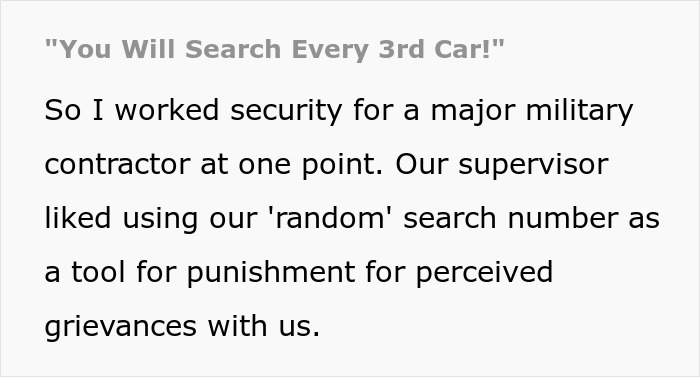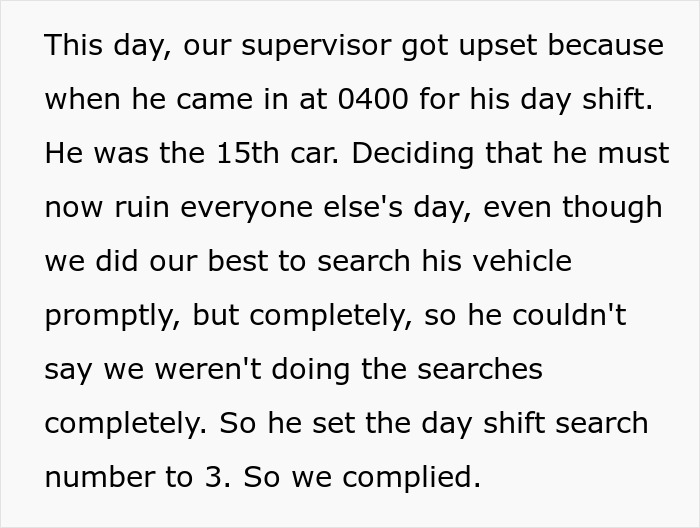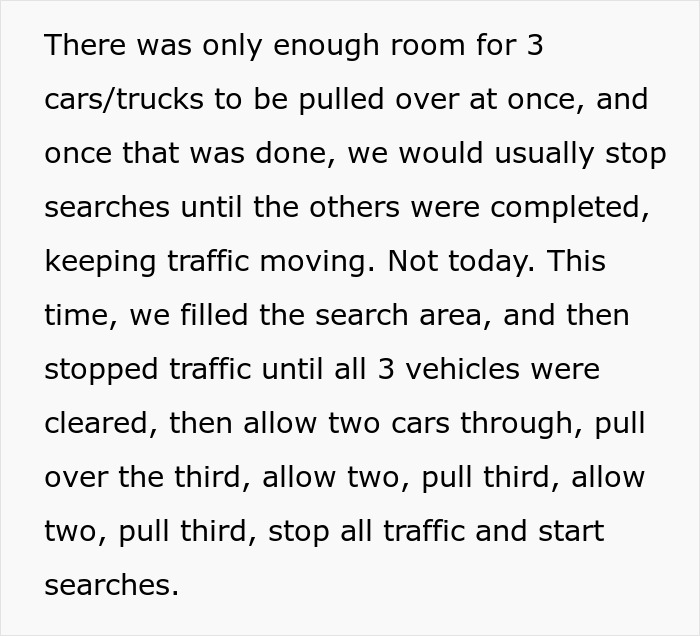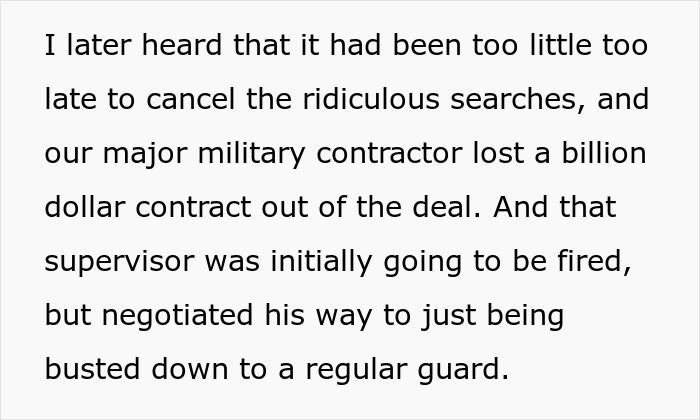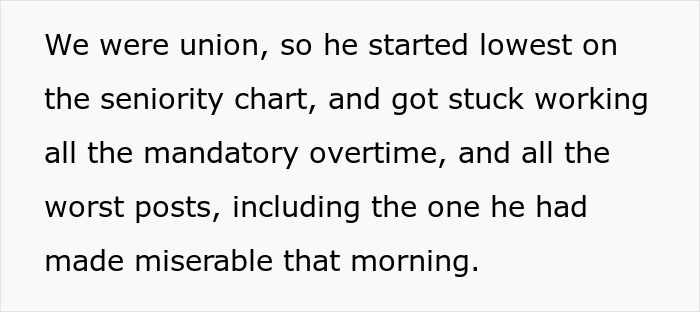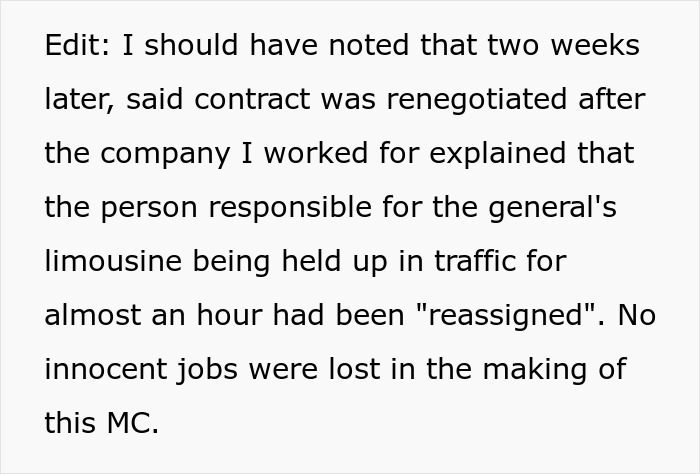“Search Every 3rd Car”: Employee’s Malicious Compliance Costs Company A Billion-Dollar Contract
One of the things we associate with the military the most is discipline. Without it, high status and order would not be possible, and anyone who tries to disrupt it is often penalized.
However, this officer’s punishment for security workers was not particularly well thought out. Only when he ordered every third car to be checked instead of the usual 15 did he realize the traffic jam he had caused and how it would affect his career.
Unfortunately for him, waiting in the 2-mile-long line was a 3-star general who was very unhappy that his precious time was being needlessly wasted trying to get to his destination.
Scroll down to find the full story and a conversation with FetzerRayne, the original author, who kindly agreed to tell us more about it.
The military environment is all about discipline
Image credits: seventyfourimages / envatoelements (not the actual photo)
However, this officer’s attempt to discipline security workers quickly backfired
Image credits: haymarketrebel / flickr (not the actual photo)
Image credits: FetzerRayne
“The best way to get rid of a stupid policy is to follow it to the letter”
!["Search Every 3rd Car": Employee's Malicious Compliance Costs Company A Billion-Dollar Contract "Search Every 3rd Car": Employee's Malicious Compliance Costs Company A Billion-Dollar Contract]()
Image credits: RDNE Stock project / pexels (not the actual photo)
Bored Panda reached out to FetzerRayne, the original author of this story, who kindly agreed to tell us more about it. Naturally, we were curious to know what inspired them to share it online.
They told us, “I was actually talking with my friend, who was also a fellow guard at the time. He was the officer doing the searches as I pulled them over. We have joked about often in the past about “the best way to get rid of a stupid policy is to follow it to the letter.”
Then, I discovered the subreddit, and texted him excited as I had personally never known the term for what we did as malicious compliance. After talking to him about our memory of that time, I decided to share it.”
In 2022, the US spent 877 billion dollars on its military, making it the highest military spending country in the world. So it is understandable that such investments need to run smoothly and maintain a high status, hence the discipline instilled in personnel.
However, Major Michael Petrusic from the U.S. Army claims that over the past decade discipline within the Armed Forces and the techniques used to maintain it have been criticized at a level only seen following World War II.
This begs the question of whether something as (mass) punishment really works to ingrain order and make army members execute commands more efficiently. Being surrounded by a similar environment, our interviewee believes that “Punishments, as defined by behavioral science as “a consequence that is aimed at reducing said behavior” can indeed work, however, punishments in the traditional sense of write-ups, demotions, and reassignments do not.”
Any results from punishments are often temporary
!["Search Every 3rd Car": Employee's Malicious Compliance Costs Company A Billion-Dollar Contract "Search Every 3rd Car": Employee's Malicious Compliance Costs Company A Billion-Dollar Contract]()
Image credits: Mikhail Nilov / pexels (not the actual photo)
As redditor FetzerRayne already mentioned, in psychology, punishment refers to the use of negative consequences to reduce or stop unwanted behavior. The goal is to form an association between an unwelcome action with a negative outcome in hopes that it will be less likely to occur again.
However, any results from punishments are often temporary, and such behaviors are likely to reappear after the consequences have passed. Several behavioral studies show how punishment promotes obedience but doesn’t help with moral reasoning, which leads them to act incorrectly without an authority figure present. The shock of negative consequences eventually wears off and they might start behaving in the same way, especially when they know that there’s no one to punish them. The most significant drawback of this is that it doesn’t teach a person what they should be doing instead.
Another thing to consider is that such discipline can have unplanned and unwanted consequences. Researchers have found that punishment increases mental health problems and leads to no positive outcomes. An individual also may develop resentment towards the person punishing them, and the moment this feeling appears they stop trying to acknowledge the things that are expected of them.
Redditor FetzerRayne proposes that “If you want to effect positive and efficient change in the workplace, work with the people who are “on the front lines” and know the challenges faced by each step of a process firsthand. Make new policies, and clarify existing ones by working together with these workers’ input.
Avoiding retaliation of any kind, but especially the petty kind like adding unneeded workloads, at all costs, as the consequences of those retaliations are often the most costly. Workers will be more motivated and inspired to make improvements to policies and procedures when they are included and considered in them.”
The post received various reactions
Commenters that also happened to be associated with the military shared similar stories
[ad_2]
One of the things we associate with the military the most is discipline. Without it, high status and order would not be possible, and anyone who tries to disrupt it is often penalized.
However, this officer’s punishment for security workers was not particularly well thought out. Only when he ordered every third car to be checked instead of the usual 15 did he realize the traffic jam he had caused and how it would affect his career.
Unfortunately for him, waiting in the 2-mile-long line was a 3-star general who was very unhappy that his precious time was being needlessly wasted trying to get to his destination.
Scroll down to find the full story and a conversation with FetzerRayne, the original author, who kindly agreed to tell us more about it.
The military environment is all about discipline
Image credits: seventyfourimages / envatoelements (not the actual photo)
However, this officer’s attempt to discipline security workers quickly backfired
Image credits: haymarketrebel / flickr (not the actual photo)
Image credits: FetzerRayne
“The best way to get rid of a stupid policy is to follow it to the letter”
!["Search Every 3rd Car": Employee's Malicious Compliance Costs Company A Billion-Dollar Contract "Search Every 3rd Car": Employee's Malicious Compliance Costs Company A Billion-Dollar Contract]()
Image credits: RDNE Stock project / pexels (not the actual photo)
Bored Panda reached out to FetzerRayne, the original author of this story, who kindly agreed to tell us more about it. Naturally, we were curious to know what inspired them to share it online.
They told us, “I was actually talking with my friend, who was also a fellow guard at the time. He was the officer doing the searches as I pulled them over. We have joked about often in the past about “the best way to get rid of a stupid policy is to follow it to the letter.”
Then, I discovered the subreddit, and texted him excited as I had personally never known the term for what we did as malicious compliance. After talking to him about our memory of that time, I decided to share it.”
In 2022, the US spent 877 billion dollars on its military, making it the highest military spending country in the world. So it is understandable that such investments need to run smoothly and maintain a high status, hence the discipline instilled in personnel.
However, Major Michael Petrusic from the U.S. Army claims that over the past decade discipline within the Armed Forces and the techniques used to maintain it have been criticized at a level only seen following World War II.
This begs the question of whether something as (mass) punishment really works to ingrain order and make army members execute commands more efficiently. Being surrounded by a similar environment, our interviewee believes that “Punishments, as defined by behavioral science as “a consequence that is aimed at reducing said behavior” can indeed work, however, punishments in the traditional sense of write-ups, demotions, and reassignments do not.”
Any results from punishments are often temporary
!["Search Every 3rd Car": Employee's Malicious Compliance Costs Company A Billion-Dollar Contract "Search Every 3rd Car": Employee's Malicious Compliance Costs Company A Billion-Dollar Contract]()
Image credits: Mikhail Nilov / pexels (not the actual photo)
As redditor FetzerRayne already mentioned, in psychology, punishment refers to the use of negative consequences to reduce or stop unwanted behavior. The goal is to form an association between an unwelcome action with a negative outcome in hopes that it will be less likely to occur again.
However, any results from punishments are often temporary, and such behaviors are likely to reappear after the consequences have passed. Several behavioral studies show how punishment promotes obedience but doesn’t help with moral reasoning, which leads them to act incorrectly without an authority figure present. The shock of negative consequences eventually wears off and they might start behaving in the same way, especially when they know that there’s no one to punish them. The most significant drawback of this is that it doesn’t teach a person what they should be doing instead.
Another thing to consider is that such discipline can have unplanned and unwanted consequences. Researchers have found that punishment increases mental health problems and leads to no positive outcomes. An individual also may develop resentment towards the person punishing them, and the moment this feeling appears they stop trying to acknowledge the things that are expected of them.
Redditor FetzerRayne proposes that “If you want to effect positive and efficient change in the workplace, work with the people who are “on the front lines” and know the challenges faced by each step of a process firsthand. Make new policies, and clarify existing ones by working together with these workers’ input.
Avoiding retaliation of any kind, but especially the petty kind like adding unneeded workloads, at all costs, as the consequences of those retaliations are often the most costly. Workers will be more motivated and inspired to make improvements to policies and procedures when they are included and considered in them.”
The post received various reactions
Commenters that also happened to be associated with the military shared similar stories
Read original article here

